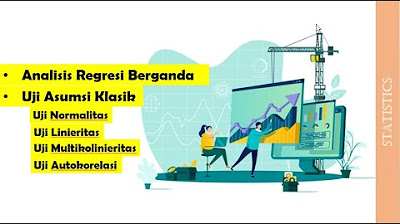KONSEP DASAR UJI REGRESI (LOGISTIK DAN LINEAR)
Summary
TLDRThis video explains the concepts of logistic and linear regression, focusing on their application in analyzing cause-and-effect relationships. The speaker contrasts univariate and multivariate analyses, emphasizing how logistic regression deals with categorical data and how multivariate analysis provides more accurate results by considering additional variables. The video also covers the process of regression analysis, the differences between causal and influential relationship types, and how predictions are made based on regression models. The speaker further highlights the practical utility of these models in fields like health and social sciences.
Takeaways
- 😀 Logistic regression focuses on categorical data, where the dependent variable is a category.
- 😀 Linear regression is used for numeric data, focusing on relationships between numeric variables.
- 😀 Logistic regression relies on multivariate analysis, comparing multiple variables to understand cause-and-effect relationships.
- 😀 Linear regression only explains simple cause-and-effect relationships, typically with one independent and one dependent variable.
- 😀 Multivariate analysis provides more accurate results than univariate analysis because it accounts for multiple factors influencing the outcome.
- 😀 The relationship in logistic regression is measured by the pituitary, with a focus on categorizing variables.
- 😀 In linear regression, the relationship's strength is measured by R-squared, showing how strongly variables are related.
- 😀 Logistic regression can predict outcomes, such as estimating cholesterol levels based on various independent variables.
- 😀 In regression analysis, two main types of regression are causal (finding cause-effect relationships) and influence (finding the most significant variable).
- 😀 Linear regression is often used for prediction, while logistic regression is used for understanding categorical outcomes and complex relationships.
Q & A
What is the primary focus of logistic regression?
-Logistic regression primarily focuses on categorical data, specifically when both the dependent and independent variables are categorical.
How does logistic regression differ from linear regression?
-In linear regression, the dependent variable is continuous, while in logistic regression, the dependent variable is categorical. Logistic regression also involves predicting probabilities for different categories.
What is the main difference between regression tests and correlation tests?
-Regression tests examine the relationship between one independent and one dependent variable, while correlation tests analyze the strength and direction of the relationship between two variables without implying causality.
What is multivariate analysis in the context of logistic regression?
-Multivariate analysis compares multiple variables simultaneously, allowing for a more comprehensive understanding of the actual relationships between variables, unlike simpler univariate tests that focus on a single cause-and-effect relationship.
How does multivariate analysis help improve the accuracy of results?
-Multivariate analysis considers multiple variables at once, which provides a more accurate and realistic understanding of the cause-and-effect relationship by controlling for other influencing factors.
What are the two types of regression analysis mentioned in the script?
-The two types of regression analysis are causal regression, which looks at the relationship between a specific pair of variables, and influential regression, which identifies the most significant variable from a set of variables.
How does causal regression analysis work?
-Causal regression analysis examines the relationship between a primary variable (e.g., smoking) and an outcome (e.g., coronary heart disease), considering the influence of other variables (e.g., exercise, diet) to understand the true effect.
What is the purpose of influential regression analysis?
-Influential regression analysis is used to identify which variables have the most significant impact on the dependent variable, helping to prioritize which variables need to be considered in further research.
What is the role of prediction in regression analysis?
-In regression analysis, prediction helps estimate the outcome (e.g., cholesterol levels) based on the values of independent variables (e.g., mother's age). This allows for forecasting future or unknown results.
What does the R-squared value indicate in linear regression?
-In linear regression, the R-squared value indicates the strength of the relationship between the independent and dependent variables, showing how much of the variation in the dependent variable is explained by the independent variables.
Outlines

هذا القسم متوفر فقط للمشتركين. يرجى الترقية للوصول إلى هذه الميزة.
قم بالترقية الآنMindmap

هذا القسم متوفر فقط للمشتركين. يرجى الترقية للوصول إلى هذه الميزة.
قم بالترقية الآنKeywords

هذا القسم متوفر فقط للمشتركين. يرجى الترقية للوصول إلى هذه الميزة.
قم بالترقية الآنHighlights

هذا القسم متوفر فقط للمشتركين. يرجى الترقية للوصول إلى هذه الميزة.
قم بالترقية الآنTranscripts

هذا القسم متوفر فقط للمشتركين. يرجى الترقية للوصول إلى هذه الميزة.
قم بالترقية الآنتصفح المزيد من مقاطع الفيديو ذات الصلة

PERBEDAAN UJI REGRESI LOGISTIK DAN UJI REGRESI LINEAR | PENJELASAN MUDAH DIPAHAMI MAHASISWA

Konsep Dasar Regresi Logistik

Lec-5: Logistic Regression with Simplest & Easiest Example | Machine Learning

Data Mining 09 - Korelasi & Analisa Regresi (1/2)

Statistik Terapan: Regresi Logistik penjelasan singkat

(1/4) Analisis Regresi : Uji asumsi Klasik
5.0 / 5 (0 votes)
